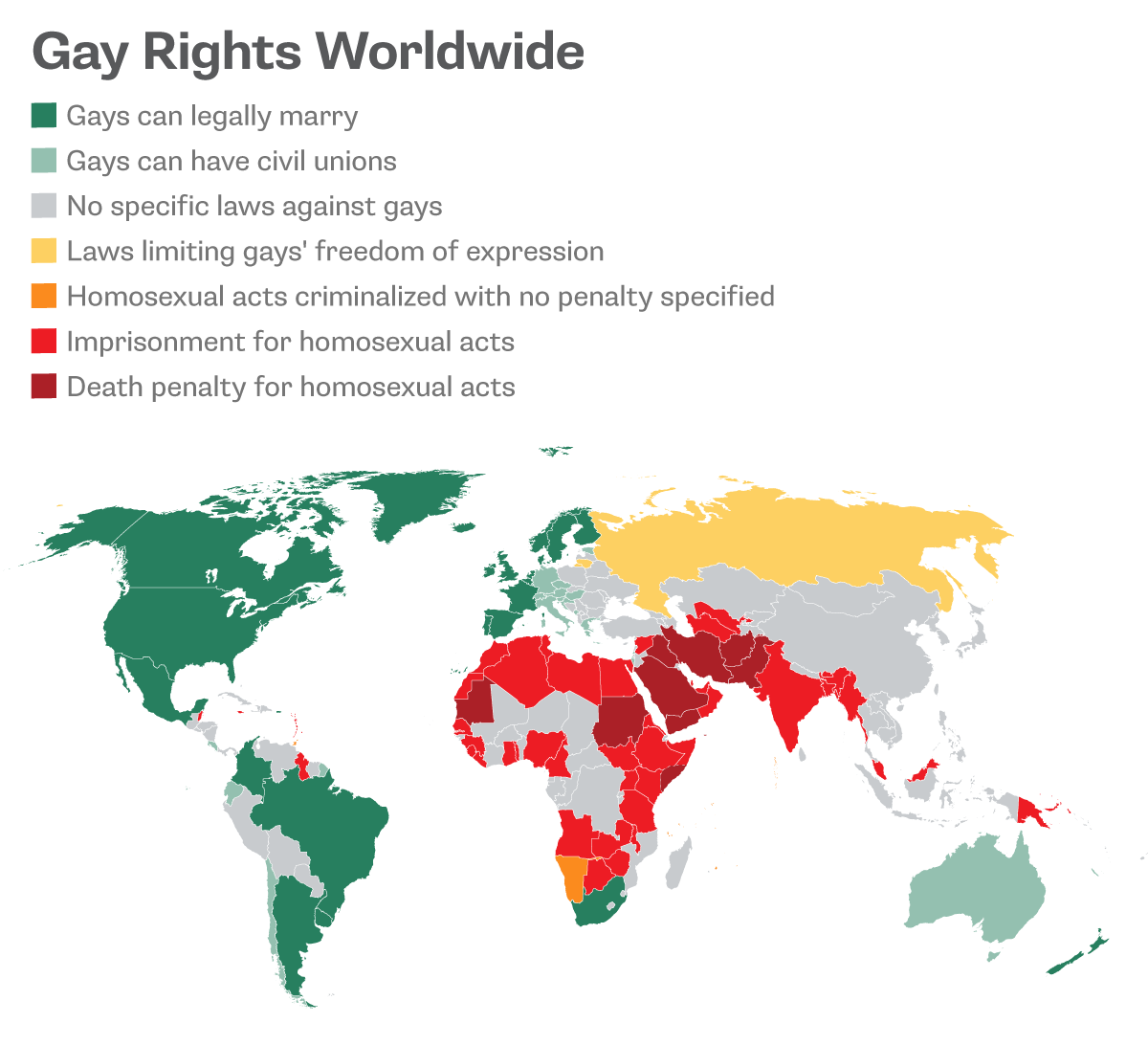Where a Gay Person Can be Themselves and Where it Can Be Hell
[Bloomberg Reports]
There’s never been a better time to be gay, except in a handful of places where it’s become worse. Gay-rights activists have made historic gains in a fraction of the time it took the movements for civil rights and women’s rights. Two generations ago, the idea that homosexuals could marry was unthinkable. Today, same-sex marriage exists in more than 20 countries. Until 1970, same-sex acts were legal in about 60 countries. Today, the number is roughly double that, leaving 79 nations where they are criminalized. On the other side of the ledger, Nigeria and Russia have raised penalties facing homosexuals in recent years, and in 2017 Russia’s Chechen Republic targeted gay men for persecution. In any case, it’s clear that change is more than passing when the leader of 1.2 billion Roman Catholics is asked about homosexuality and responds, as Pope Francis did in 2013, “Who am I to judge?”
The Situation
Opposition to gay rights on religious grounds has dwindled in societies that have become more secular and urbanized. In Serbia, a patriarchal and conservative country, a lesbian became prime minister in 2017, and in Ireland a gay man won the same post. Also this year, Germany’s parliament approved gay marriage, as did Australia’s, although the weddings won’t start there until early 2018. The U.S. Supreme Court ruled in 2015 that same-sex couples have a constitutional right to marry, bringing gay marriage to the 14 states where it was still banned. South America is shedding its machismo to emerge as a gay-friendly haven. The situation in Asia is varied. A court ruling in 2017 put Taiwan on course to become the first Asian country to legalize same-sex marriage. Buddhist Vietnamand Thailand are more tolerant than super-modern Singapore, which has kept a colonial-era sodomy law. Intolerance is the norm in former Soviet satellites, and persecutionabounds in the Middle East and other places where Islam is dominant. In Chechnya, more than 100 men suspected of being gay were abducted and tortured by authorities, according to independent Russian newspaper Novaya Gazeta. Where treatment is worsening, gay bashing often is a political tool. Russia’s law against gay “propaganda” is part of President Vladimir Putin’s war on U.S. and western European values. Laws or proposed laws targeting homosexuals in Africa can divert attention from corruption and economic malaise.

The Background
Throughout history, being gay has meant keeping a secret or paying a price. Even the ancient Greeks, widely thought to have embraced homosexuality, in fact accepted only pederasty — sex between a man and a male teenager. Homosexuals were massacred in the Holocaust. Until 1973, the American Psychiatric Association classified homosexuality as a mental disorder; it was sometimes treated using electric shocks. The 1969 police raid of a New York gay bar triggered the Stonewall Riots, which gave birth to the modern gay-rights movement. Two decades later, a backlash against urban gay males in the early days of the AIDS pandemic gave the movement a sense of urgency. The increasing numbers of homosexuals, including celebrities, who “came out of the closet,” drove a sea change in public opinion in North America, Europe and much of Latin America. Gains by gay activists paved the way for the growth of the transgender-rights movement.
The Argument
The United Nations, through its Human Rights Council, in 2014 committed to overcoming discrimination based on sexual orientation everywhere. The question is how to influence governments where negative attitudes toward homosexuality are steeped in cultural and religious beliefs. The World Bank and several countries suspended or cut aid to Ugandaafter it increased jail terms for homosexual acts in 2014. After the law was voided on a technicality, the country’s president dropped his support for it, citing potential economic consequences. Uganda may be a special case, however, because it relies on foreign aid. Some policy specialists argue that donors who condition foreign aid on protecting gay rights can come across as bullies promoting a foreign agenda. They suggest instead supporting grass-roots groups. Another route is to highlight the economic costs of isolating a segment of society. Anti-gay discrimination cost India 1.7 percent of its gross domestic product, according to a 2014 World Bank study.
By
Flavia Krause-Jackson
The Reference Shelf
- The report of the International Lesbian Gay Bisexual Trans and Intersex Association describes the status of gay rights around the globe.
- A Pew Research Center report explores the major religions’ stands on gay issues.
- A UN report, the first of its kind, documents discrimination and persecution of gay people.
- In his book “Stonewall,” historian Martin Duberman provides a first-hand account of the birth of the modern gay-rights movement.
- A Bloomberg data visualization illustrates the rapid pace of change on gay marriage in the U.S.

Comments